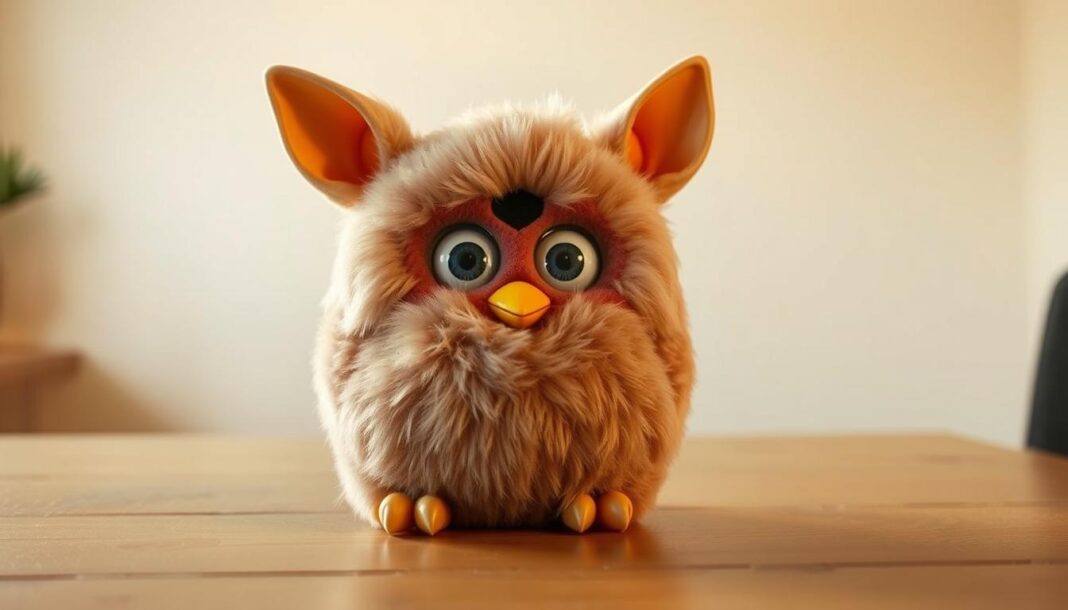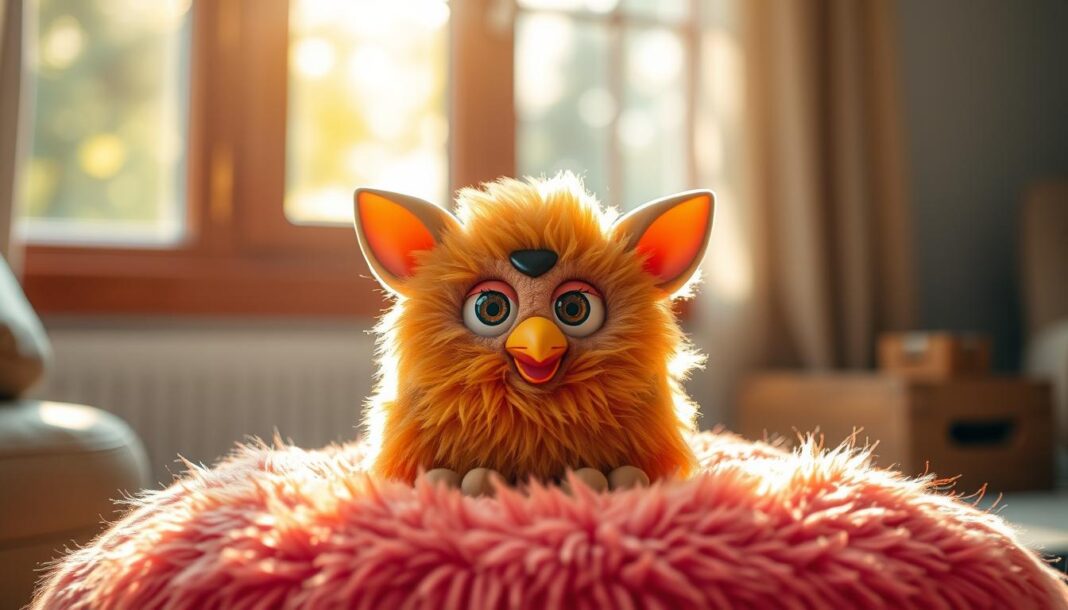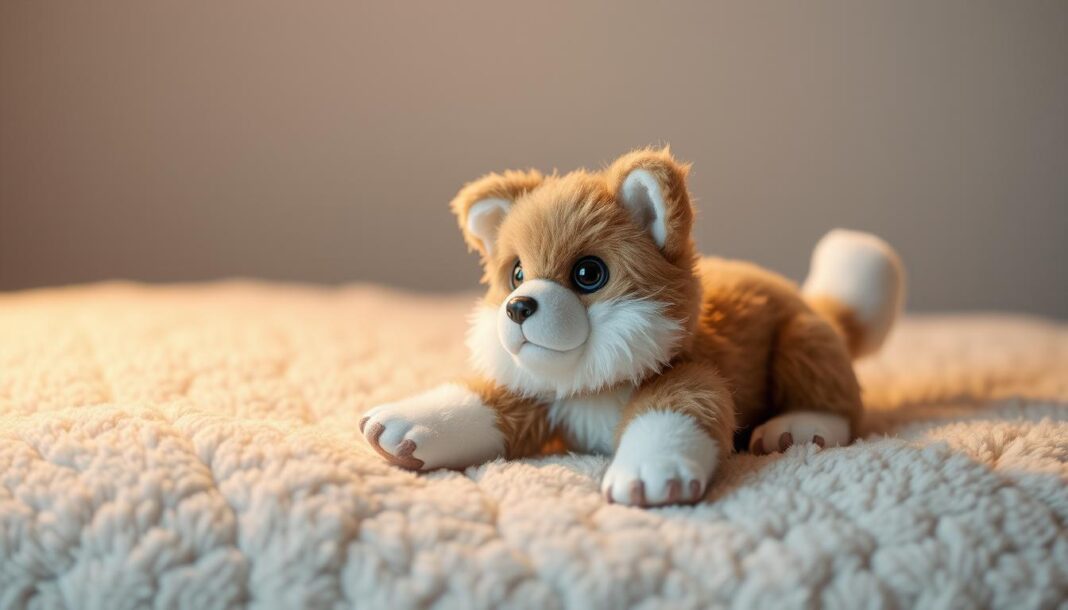Once a $35 toy, Furbies now command prices from $100 to over $4,500 among collectors. The market for these interactive pets has exploded, fueled by nostalgia and scarcity.
Special editions, like the Millennium Furby, have sold for thousands. With vintage toy markets growing at 10.1% annually, rare models are becoming prized assets.
Condition, limited releases, and cultural trends heavily influence price. Only 500 Special Angel Furbies exist, making them highly sought-after.
Whether you’re a collector or curious owner, understanding these factors helps gauge your toy’s worth in today’s booming market.
An Introduction to the Furby Phenomenon
FAO Schwarz’s 1998 holiday season featured an unexpected star—a chatty, wide-eyed toy with a language all its own. The 1998 Furby wasn’t just a plaything; it was a tech marvel that learned English over time, charming kids and collectors alike.
The Birth of Furby and Its Rise to Popularity
Debuting at $35, these electronic pets sold 1.8 million units in their first year. By 2001, over 40 million had found homes. Demand was so fierce that resale prices hit $200+ during peak years.
Its secret sauce? “Furbish,” a gibberish language that gradually shifted to English. This feature made each interaction feel personal, fueling obsession.
The Evolution From 1998 to Modern-Day Furbys
Later models packed smarter tech. The 2005 Emoto-Tronic version recognized voices. By 2016, Bluetooth let owners control their pets via app.
Even governments took notice—the NSA banned them over infrared sensor fears. Today’s models boast 600 phrases and dance to voice commands, proving this toy’s staying power.
Determining the Original Furby Value
Not all Furbys are created equal—some command jaw-dropping sums in today’s market. Three key factors decide their worth: rarity, condition, and exclusivity. Whether you’re a seller or collector, understanding these can unlock hidden market value.
Impact of Rarity and Exclusive Releases
Scarcity drives prices skyward. Only three Rainbow Furbies exist, while the Hi-C contest edition capped at 5,000 units. The Swarovski crystal model, priced over $100K, proves how limited runs dominate the market.
Condition and Packaging: How They Affect Worth
Mint-in-box 1998 models sell for 300% more than loose ones. Authentic original packaging with crisp inserts boosts appeal. Beware of reboxed fakes—experts check serial stickers and tape seals.
Special Editions and Promotional Furbys
Collaborations like the Chicago Cubs edition ($250–$400) or unopened Kids Cuisine ($520) attract niche buyers. Below, see how exclusivity scales prices:
| Edition | Price Range | Units Produced |
|---|---|---|
| Swarovski Furby | $100K+ | ~500 |
| Target Jester | $100–$300 | 10,000 |
| Kmart Racing Flag | $80–$100 | 15,000 |
From fast-food promos to luxury collabs, special edition tags guarantee premium bids. Track auction trends to spot undervalued gems.
Generations and Varieties: Understanding Different Furbys
The evolution of these electronic pets spans multiple generations, each with unique tech upgrades. Over the years, designs shifted from basic interactivity to advanced features, creating tiers of collectibility. Whether you own a first-gen classic or a modern rarity, knowing their differences unlocks their true potential.
1998 Original vs. 2005 Emoto-Tronic Furbys
Early models from 1998 learned English gradually, charming users with their quirky personalities. The 2005 Emoto-Tronic line doubled in size and added voice recognition. These could communicate with each other, a leap forward in interactive play.
Today, the Emoto-Tronic series fetches $200–$300, prized for its rarity. Collectors note its larger eyes and expressive eyebrows—features absent in vintage versions.
Limited-Edition and Regional Variants
Special releases like Japan’s “Kids Cuisine” or Europe’s “Royal” edition command premium prices. These limited edition runs often had unique color schemes or accessories.
Generation-specific markups also apply:
- Gen 4 (Dragon/Cheetah): +17–20% value
- Gen 7 (Banana Peel/Mink): +50% due to scarcity
Baby variants, like 2005 Emoto-Tronic Babies, are smaller but equally sought-after. Their compact size and rare packaging make them standout pieces.
How Much Is a Furby Worth Today?
From childhood toy to collector’s item, these electronic pets now span a wide price spectrum. Common models sell for $50–$150, while rare editions fetch up to $4,500. The market thrives on nostalgia, scarcity, and cultural trends.
Current Market Trends and Price Ranges
Sealed 1998 models dominate auctions, with a 27% yearly increase in sales. Loose versions average $75, but new-in-box (NIB) units hit $360. Special Angel editions, limited to 500 units, now command $500+.
Modern releases like the 2023 model retail for $69.99. Yet, vintage pieces outperform them in value. eBay data shows Gen 1 Furbys as top performers.
Comparing Common vs. Rare Furbys
Mass-produced Gen 1 toys are affordable, while 500-unit Blue/Green Eye editions soar. The Hasbro Connect (2016) and Party Rockers (2014) highlight modern collectibility gaps.
Key price tiers:
- Budget: $50–$150 (common models)
- Mid-range: $200–$1,000 (limited editions)
- Premium: $1,000+ (Swarovski, contest exclusives)
Rarity drives bids, but condition and provenance seal the deal. Track auction trends to spot undervalued gems.
A Glance at the Most Valuable Furbys Ever Sold
Collectors worldwide chase rare Furbys, with some paying luxury-car prices for coveted editions. The market’s top-tier sales reveal astonishing figures, driven by scarcity and pop-culture allure.
Special Editions That Fetch Top Dollar
The *special Furby angel* release, limited to 500 units, now sells for $800+. Swarovski’s gemstone-encrusted model holds the record at $100K+. These editions thrive on exclusivity and flawless craftsmanship.
Other high-rollers include:
- Millennium Edition ($4,500): Celebrating Y2K with metallic finishes.
- Rainbow Furby (3 units): Custom designs for VIP clients.
- Hi-C Contest Edition (5,000 units): Unopened boxes fetch $1,200+.
Record-Breaking Sales: The Priciest Furbys
Auction anomalies stun even experts. A 2000 Wrigley Field Cubs model sold for $400—triple its 2023 resale average. Celebrity-owned prototypes (like rumored Kardashian pieces) lack verification but fuel speculation.
Market shifts are undeniable. Top-tier models surged 62% in value from 2019–2023. Below, the highest confirmed sales:
| Edition | Price | Key Feature |
|---|---|---|
| Swarovski Crystal | $100K+ | Hand-set gemstones |
| Millennium | $4,500 | Limited Y2K release |
| Kids Cuisine NIB | $520 | Fast-food promo |
Provenance matters. Certificates of Authenticity (COAs) are critical for *Emoto-Tronic* rarities. As demand grows, so does the *money* flowing into this niche.
Furby Appraisal Online and Valuation Resources
Determining the true worth of your electronic pet requires accurate appraisal methods. Whether you plan to sell furby or grow your collection, reliable tools and experts can pinpoint its market standing. Below, we outline DIY checks and professional services to help you make informed decisions.
Tips for Conducting Your Own Evaluation
Start by inspecting key components. Original sensors and language chips should function flawlessly. Check for intact box barcodes—these often verify authenticity.
Documentation matters. Provenance records, like FAO Schwarz receipts, boost value furby estimates. Watch for red flags:
- Repainted fur (indicates restoration)
- Replaced batteries (1998 models need NiCd originals)
- Missing inserts or damaged packaging
Where to Get Professional Appraisals
For rare finds like vintage furby editions, consult certified experts. ToyMasters USA offers detailed reports, while RetroCollect Certification Network verifies limited releases.
Online platforms simplify comparisons. WorthPoint’s database tracks auction histories, and CollectibleFurbyIndex.com updates real-time pricing trends.
| Service | Specialty | Turnaround |
|---|---|---|
| Heritage Auctions | Rare editions | 3–5 days |
| eBay Sold Listings | Market benchmarks | Instant |
| CollectibleFurbyIndex.com | Trend analysis | Daily updates |
Proper care preserves worth. Store units away from sunlight and humidity to prevent damage. For high-value pieces, consider climate-controlled display cases.
The Current Resale Market: Where to Sell and Buy
Navigating the resale market for these iconic toys requires knowing where to look. Whether you want to sell furby collectibles or expand your hoard, platform choice impacts profit margins and buyer reach.
Online Auctions and Collector Forums
eBay handles 73% of online sales for these items, but its 12.9% fee cuts into profits. Etsy charges just 6.5% for vintage toy listings, making it ideal for rare editions.
Niche communities offer better deals. Facebook’s FurbyHolics group (15K members) connects serious collectors. Key advantages:
- No listing fees for direct sales
- Built-in authentication from experienced members
- Faster sales for high-demand items
Brick-and-Mortar Shops and Pawn Stores
Physical stores typically pay 40% below online market rates. However, PopSwap consignment shops specialize in retro items and handle marketing for a 25-30% cut.
When dealing with pawn shops:
- Bring printed eBay sold listings as leverage
- Highlight mint-condition packaging
- Mention Julien’s Auctions comps for rare editions
The market favors prepared sellers. Cross-check multiple platforms before committing to any sale method.
Maintaining the Worth of Your Furby: Care Tips
A single storage mistake could slash your collectible’s worth by half overnight. Proper care preserves both functionality and market appeal. Follow these expert methods to protect your investment over time.
Preserving Original Packaging
Mint-condition boxes add 15% to resale value. Use acid-free containers to prevent yellowing. Store them flat to avoid creases that devalue original packaging.
For 1998 models, keep these components intact:
- Factory tape seals (never replace)
- Instruction booklets with crisp edges
- Unused warranty cards
Cleaning and Storage Best Practices
Create a home environment that prevents damage. Ideal conditions include 65-70°F temperatures with 45-55% humidity. These settings stop mold and plastic degradation.
Follow this cleaning protocol:
| Component | Tool | Frequency |
|---|---|---|
| Fur | Microfiber cloth | Monthly |
| Sensor ports | Cotton swabs | Quarterly |
| Battery compartment | Isopropyl alcohol | Before storage |
Remove batteries from 1998 models to prevent capacitor leaks. For display, use museum-grade UV glass cases. Collections exceeding $10K should have specialized insurance riders.
Rare Furby List: Identifying Hidden Gems
Among toy collectors, certain editions stand out as true unicorns—impossibly rare and wildly valuable. These items often surface in auctions or private sales, fetching prices that dwarf standard releases. Knowing what to look for separates casual fans from serious investors.
Top 5 Rarest Furbys and Their Traits
The rarest models share key traits: limited production runs, unique materials, or cultural significance. Here’s the elite tier:
- Swarovski Crystal Edition (5 made): Hand-set gemstones and $100K+ price tags.
- Millennium Edition (1999): Metallic finishes celebrate Y2K; sells for $4,500+.
- Rainbow Furby (3 units): Custom VIP designs with no public release.
- Hi-C Contest Edition (5,000 units): Unopened boxes hit $1,200.
- Chicago Cubs Promo (2000): Team-branded; $300–$400 range.
How to Spot a High-Value Furby
Authentication separates treasures from fakes. Check for:
- Tiger Electronics logos (1998–2001) vs. Hasbro reboots.
- Japanese “Furby Boom” variants with exclusive color schemes.
- Prototypes with non-working sensors and R&D paperwork.
Custom mods (like Long Furbys) often reduce worth by replacing original parts. Stick to mint-condition, unaltered special edition finds for maximum returns.
The Future of Furby Collecting and Market Trends
Investors are now eyeing nostalgic toys as unexpected assets with strong growth potential. The collectibles sector shows no signs of slowing, with vintage electronics leading the charge. As younger buyers enter the space, traditional valuation models are being rewritten.
Predicted Growth in Vintage Toy Markets
Industry reports project a 10.1% annual growth rate through 2032 for retro toys. Three factors fuel this surge:
- Millennials spending disposable income on childhood favorites
- Grading companies like CGC now certifying plush toys
- Cross-generational appeal between Furby and Furby Boom lines
Rare 1998 models have outperformed the S&P 500 since 2020. This trend suggests market stability even during economic downturns.
Why Furbys Remain a Smart Investment
Gen Z accounts for 41% of recent sales, blending irony with genuine appreciation. Their spending habits differ:
- Prioritizing complete sets over single items
- Valuing technological nostalgia as tangible history
- Using social media to validate purchases
The money flowing into this niche reflects broader cultural shifts. However, overproduction of 2020s models could dilute value for common editions.
Smart collectors focus on verified rarities with authentication. As demand grows, early adopters stand to gain the most from this evolving market.
Your Next Steps in the Furby Collector’s Journey
Ready to dive deeper into the world of nostalgic toys? Start by taking inventory of your items using a detailed valuation checklist. This helps spot hidden gems in your home collection.
Connect with fellow enthusiasts through groups like the National Retro Toy Collectors Association. Sharing knowledge can reveal new opportunities and market trends.
For technical verification, explore Hasbro’s patent archives. Understanding engineering details adds credibility when buying or selling rare pieces.
Timing matters—Q4 holiday spikes boost demand. Plan sales strategically to maximize returns. For long-term growth, consider legacy collections that appreciate over time.
Now’s the perfect moment to act. Whether preserving or profiting, your next move could unlock surprising value.


